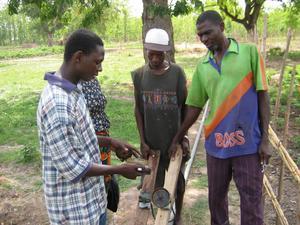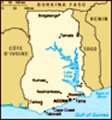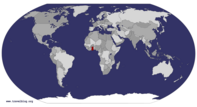Advertisement
Published: March 25th 2005

 Pump servicing #1
Pump servicing #1
Abukari (left) doing some pump servicing.Hello McGill EWB Team!
I hope this finds you well and rested from the Easter Holiday, and not too burned-out from the end-of-semester assignments and fundraising efforts! I have decided to write-up this special post on my blog such that you have a better idea of my work here, as well as a better idea of the development realities I am facing at the time. Hope you will find the read enjoyable and thought provoking!
Quick overview:
So as some of you might know, the small-scale irrigation project the McGill team and I were tied to ran out of funds last December. This means that since then, there is no one in the EnterpriseWorks (our partner NGO) office working on it, and no office resources (vehicles, promotion expenses, travel expenses) can be allocated to it. This project has mostly taken place in the 3 Northern regions of Ghana, specifically based out of a city called Tamale (13 hours North from Accra, the capital on the coast). Until the funding ran out, an agriculture expert by the name of Abukari was the leader of this project. Since December Abukari’s salary has been cut so he has asked the Ministry of

 Pump servicing #2
Pump servicing #2
Louis (left, ha!) doing some pump servicing with the local farmers.Food and Agriculture to provide him with a revenue to pursue the project (which they have agreed to provide, but have not paid yet), but there is still no budget for any other project expenses, which Abukari now pays from his own pocket, to keep this project alive on “intensive care”. Since my arrival, it has been clear that my major responsibility in this project would be to find money to get it up and running again. This is why I wanted to head up to Tamale and meet with Abukari and see what direction, and how much money, we were talking about for this revival.
Findings:
The good news is that the local manufacturers of Tamale trained by EnterpriseWorks are still selling pumps, not many, but still a little. This is partly explained by the fact that the radio station still owed EW 6 months of pump advertisement! Although, this is only a small part of the promotion plan, the other being pump demonstrations in rural communities, which has completely halted with the funding.
So what is keeping Abukari the busiest is visiting the farmers for pump servicing. The plan was that the manufacturers were supposed to sell

 The outflow of a treadle pump
The outflow of a treadle pump
Farmer at the output of the treadle pump watering some cabbage and other vedgetables.the pumps to the farmers and train them on how to maintain their own pumps. But realistically, none of them are doing that, because they have no reasons to… especially if it means farmers will be coming back to see them for more maintenance work! The other problem is that farmers live too far away from Tamale that they get discouraged when their pump stops working, or is not working as well as before, and they revert back to the old method of bucket watering. So Abukari surveys the 100 pump users or so, dispersed over the top half of the country that are the 3 Northern regions, and makes sure their seals are not too warn-off, the valves are still functioning and no other parts have failed. He also gives positive reinforcement to farmers that use and maintain their own pumps, provides additional farming advice and keeps the trust relationship alive and well, something extremely important to the sustainability of this project, but often overlooked and difficult to fundraise for!
Overall situation:
Surprisingly enough, looking at the whole situation is not very simple! 😉 Did anyone say development was complex?!? Here are a couple of elements:
-As mentioned

 Development in the 70s!
Development in the 70s!
My first evidence of international development in the 70s... the treadle pump's ancestor!earlier, we need to make the promotion and servicing of the pumps sustainable/profitable in some way. We also need to ensure quality pumps are manufactured and pump purchasers are visited frequently. It seems that the solution for this one is that Abukari would open up a pump distribution and servicing company, basically a pick-up truck and a warehouse for him to do what he does now, but more efficiently, and making a profit. He would purchase the pumps (only the good ones) from the manufacturers in bulk and distribute them to local farmers, along with training and spare parts. He would then revisit them regularily for servicing and the supply of other agricultural inputs. I have cracked some numbers for this, and by Canadian standards it makes a bit of sense, but by Ghanaian standards, I have no idea. And this solution is far from perfect as it will definitely be more advantageous for Abukari to promote and service pumps near Tamale, rather than in farther off communities. And we have assessed that this shop will barely make a profit, which makes it very vulnerable to fluctuating markets and setting-up a competing shop in the next major Northern town (which

 Bread Making
Bread Making
A women's livelihood: cooking bread. A group of them from neighboring houses meet at Asemawu's oven every morning.is usually a good idea) would split up the already small market and kill either, if not both, shops. So, I ask you, what should we try?!?
-Also, we are still waiting for an answer from the “FARMER project”, a CIDA fund that gives money to food security projects in the North of Ghana. This would give EW a substantial amount of money to train more manufacturers, do a couple hundred demonstrations and possibly allow Abukari to set-up his “distribution and servicing shop”, although it was not a part of the actual proposal. Keep your fingers crossed!
-There are other funding possibilities, from local NGOs and other international development agencies (Dutch, Danish, French, Germans, British, etc.) that could fund this project at different amount levels. This means proposal writing time, and much much waiting.
-And then there is OICI, another NGO which just got a really big grant for a really big project which combines water, food security, education and HIV/AIDS awareness to the North of Ghana. They actually want to sub contract EW for the small-scale irrigation part of their project, so that we can promote the treadle pumps. However, since I’ve been here, there has been a political

 View of Nyankpala
View of Nyankpala
The houses, cows and trash around Nyankpala.game between the head of EW and OICI to see how much money EW will get, and how big of services they will deliver to OICI. So until they agree, nothing gets done. The problem is that their “negotiation strategy” is to NOT call the other party, such that they get to BE ASKED for either the money or the services, giving them the upper arm in the discussion. Again, we are waiting!
So I guess this gives a summary of the information I have been able to gather so far, and explains why the situation with Lindsay’s placement is not so well defined at the moment. I am working with Russ to have it defined as soon as possible, but more importantly to make sure her talent and expertise will be useful, and that she will have a good learning experience! If not with the pumps, we have a couple good leads!
As for information about what else I have been doing, well here is a quick list. After all, this is what you have put so much energy to fundraise for in the last 8 months! (mind you, this is only 10% of my time here!)
-design of ceramics production equipment for fuel efficient stoves
-design of a technical data collecting protocol for wind energy technology
-director of a promotional video on wind energy technology
-preparation of conference materials for an international conference on fuel efficient technology
-visit to Tamale, meetings with a couple potential donors and writing of proposals
-management of a national conference on Indoor Air Pollution
-lots of communication with Russ!
The biggest problem with this involvement is that it is mostly based in Accra, and far from the rural farmers, which is EWB’s main focus. This will hopefully be resolved shortly, as we get involved in other projects (hopefully the pumps) and I make time to immerse myself in a rural community and gather baseline data for EWB.
About the life:
Although my time in Tamale was short, I was able to experience a little bit of the life in a village about 30 minutes away for town. It is called Nyankpala, and this is where Abucari lives. In order to give you an idea of the life in this community I have taken a couple pictures and asked the 7 children to map their daily schedules, and that of their mothers. Abukari is unmarried and lives in a small compound with his bother, his brother’s 2 wives and their 7 children (aged 0.5 to 15 years old). They are all of Muslim faith, but they listen to Christian gospel music, because they say it’s upbeat and motivating in the morning. They also have Voodoo and animist beliefs. As livelihoods, Abukari’s brother, Mohammed works at a local Dutch NGO all week and sleeps at a neighboring village, only to come back on the weekend. One of his wives, Asemawu, cooks bread, and the other, Anatu, sells her sister’s crops (beans and maize) at the town market. Because of Mohammed’s salary and because they are close to a major town, they are considered a medium wealth family and their huts have metal roofs, electricity, and all of the school aged children attend school. So here are their weekday time schedules… keep in mind this is not set in stone and was not monitored:
Mustag (2nd eldest son)
Note: Similar schedule for all school aged kids, except that girls fetch water early in the morning.
6h00: wake-up, brush teeth, bath, pray and eat breakfast
7h00: walk to school
7h30: sweep camphouse
8h00: form assembly
8h30: move to class
10h15: break
10h30: back to class
12h00: break
12h30: back to class
13h30: finish school and walk home
14h00: pray, eat lunch and house chores
15h00: pray and house chores
16h00: football
18h00: bath and pray
20h00: dinner and watch national TV
21h00: go to bed
Asemawu
3h30: make fire inside bread oven and pray
4h30: wake-up her girls, fetch water and prepare baths
6h00: bath her kids and cook bread and household chores
12h00: cook lunch
13h00: pray and go to town to prepare dough bread (yeah for Canadian wheat!)
15h00: pray and return to village and household chores
18h00: cook dinner and bath her kids
20h00: eat dinner
21h00: fetch water
22h00: pray and sleep
Anatu
3h30: light-up cooking fire and pray
4h30: wake-up her girls, fetch water and prepare baths
6h00: bath her kids and cook breakfast
7h00: go to Tamale market to sell beans and maize
18h00: come back to house and cook dinner and bath her kids
20h00: eat dinner
21h00: fetch water and bath the small kids
22h00: pray and sleep
Hope that you found this interesting and informative. I would be glad to answer any specific question about the life here and/or the project. I am sorry I have not communicated more than this since my arrival, but it took me a while to figure out what my role should be here and how I was going to position myself to have positive impact. I wanted to thank the McGill chapter for their fundraising efforts, I know how hard it can be, but hoping that you had fun and feel good about yourselves. You have accomplished much and I am thinking of you every day when I am able to contribute some of my skills to the office or change a Ghanaian’s perspective about us Obruni’s (white man).
I wish you all best of luck in your exams and summer plans! Thanks again for all of your involvement and WARMEST regards from Ghana!
Cheers!
Advertisement
Tot: 0.093s; Tpl: 0.027s; cc: 6; qc: 45; dbt: 0.0498s; 1; m:domysql w:travelblog (10.17.0.13); sld: 1;
; mem: 1.1mb








